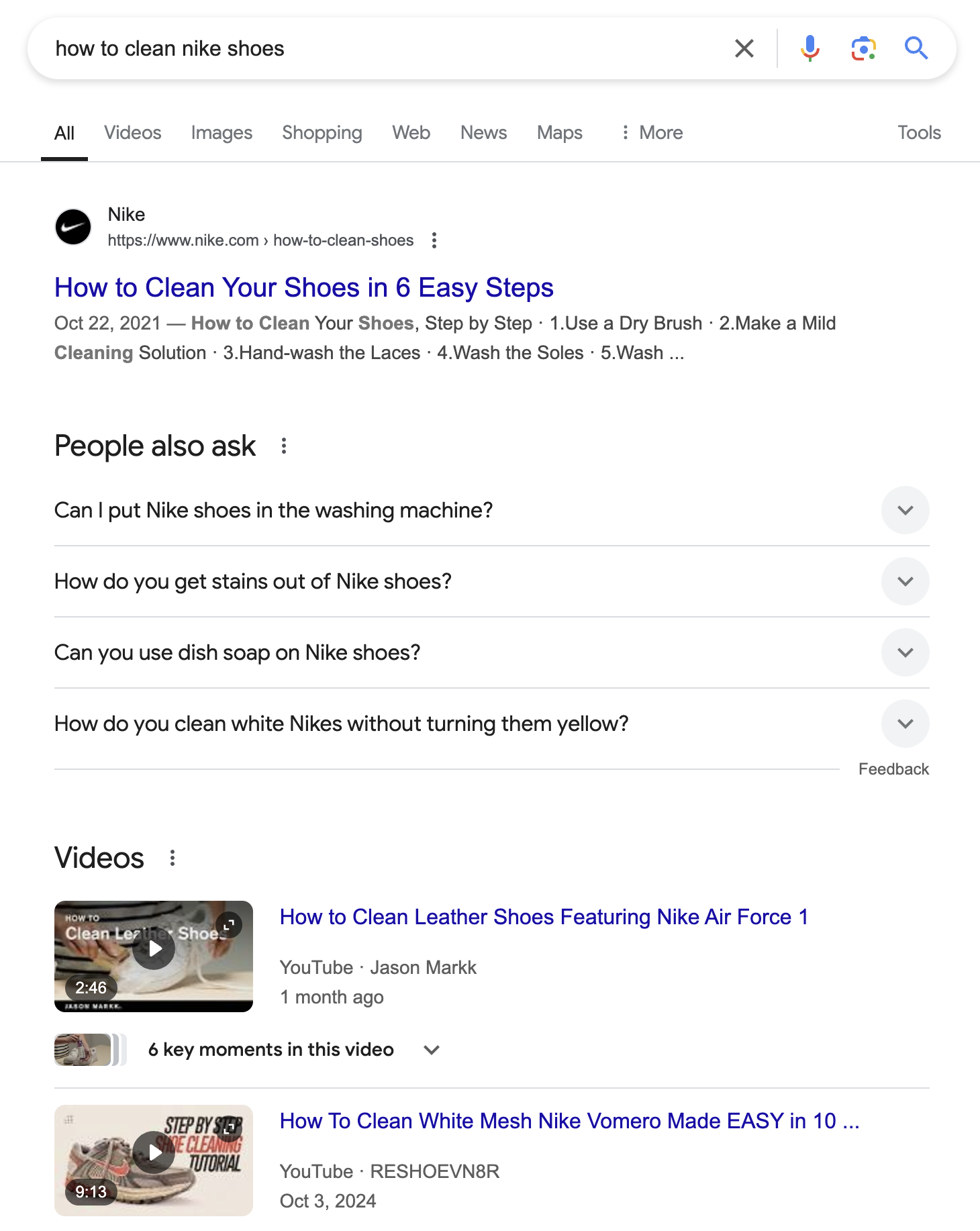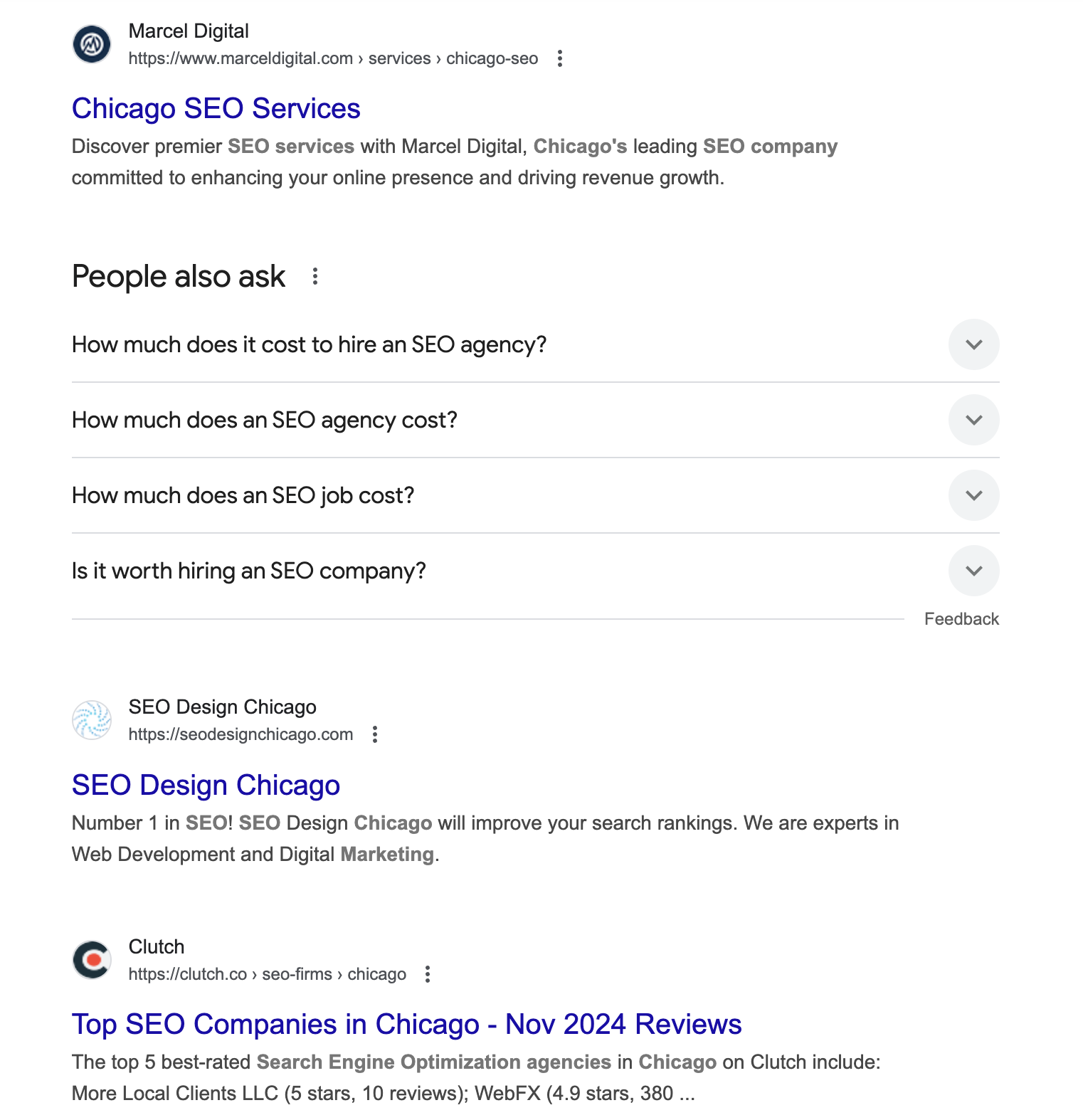You can’t talk about SEO without mentioning keyword research.
Most SEO marketing campaigns start with keyword research. (Or at least they should).
If you haven’t upped your keyword research game, you could be holding your campaigns back and costing you (and your clients) cash.
Let’s look at 18 keyword research mistakes you might be making – and what to do instead.
1. Ignoring Search Intent
Too many people focus on search volume and forget about the why.
Why are people using a specific keyword?
What does that term tell you about what that person is looking for?
Most importantly, what is the point of ranking No. 1 for a term that doesn’t actually lead to any sales?
Rather than focusing on how many people use a search query, focus on search intent or the reason why someone is searching.
User intent breaks down into two things:
- Figuring out what users who come to your pages want to consume.
- Making your content the best option for those users.
So, let’s say you sell new Nike shoes.
There’s not much point in targeting [how to clean Nike shoes] because those people likely aren’t ready to buy; they are looking to take care of the shoes they already have.
 Screenshot from search for [how to clean Nike shoes], Google, December 2024.
Screenshot from search for [how to clean Nike shoes], Google, December 2024.Granted, you could use [how to clean Nike shoes] to build trust and catch those buyers later, but that needs to be done intentionally.
2. Allowing Clients To Choose Keywords
One of the biggest keyword research mistakes of all is failing to do keyword research at all.
We’ve all had that client who wants to “help” by telling you what keywords they want to target. Unfortunately, those terms are often too broad, don’t match search intent, or are too competitive to even bother with.
That client list should be a starting point, not an endpoint.
A lot of business owners (and even SEO marketers) think they know what searchers are looking for, but keywords should be based on data, not vanity or gut instinct.
3. Forgetting To Look At The SERPs
There are plenty of powerful keyword research tools that make keyword research so much easier.
You can dig deep into data, look at historical trends, even see what your competition is ranking for.
It’s solid, useful data.
However, there can be too much of a good thing.
Many marketers spend so much time diving deep into research tools that they forget to look at the one place that really matters – the SERPs.
Don’t let tools take over the entire keyword research process. Take the time to see what type of content is ranking for your top terms and use that to inspire your campaigns.
4. Aiming For One Keyword Per Piece Of Content
Some SEO marketers only target one keyword per piece of content.
Google is getting better at understanding context, which means optimizing for just one keyword per post is a thing of the past.
Rather than targeting a single keyword, look for related terms that support the main term.
For example, a post about keyword research should also target related terms like keyword research tools.
Just keep in mind this shouldn’t be forced – only use related terms that make sense for your content.
5. Targeting High-Volume Keywords Only
What metrics do you look at when considering what keywords to target?
If high-volume keywords are your go-to for finding the right keywords, you could be missing out on better options.
Why?
Because high volume often ignores user intent, which we’ve already talked about.
Plus, high-volume terms are highly competitive. It’s hard to stand out when you go after the same key terms as everyone else.
This is widely recognized as a way not to do SEO:
Ways NOT to do SEO:
❌ turn Rankmath/Yoast "green"
❌ focus only on "easy" keywords
❌ focus only on high volume keywords
❌ plagiarize/copy someone else
❌ never plan your topic clusters
❌ write on multiple content silos at once
❌ never update content— Nina Clapperton (She Knows SEO) (@NinaClapperton) September 23, 2024
Don’t forget to look for mid-volume keywords that match search intent – they are easier to rank for and cheaper to bid on.
6. Avoiding Long-Tail Keywords
Long-tail keywords often have a lower search volume, which turns some marketers away. That’s a mistake you can’t afford to make.
Sometimes, low search volume is a good thing. Lower volume key terms are often further in the sales funnel, meaning the user is much closer to making a purchase.
Using various contextual keywords can also ensure you cover a topic more broadly and are more likely to provide visitors with the content they need to convert.
7. Not Talking To Your Customers
Sometimes, the terms we use to talk about our product or service aren’t the same terms our customers use to talk about our product or the problems they face.
In addition to using keyword research tools, it’s critical to talk (and listen) to what your customers say.
Pay attention to how they describe their challenges, the solutions they find, or what types of products they want.
Look at reviews and social media posts, and listen to customer service calls to find the words and phrases customers use to talk about the challenges they face and the solutions they’ve tried.
For example, you might call your tool a “website visitor tracking tool,” but if your customers don’t know what that means, you won’t gain any traction.
8. Going Back To Insert Keywords
Some SEO marketers seem to think creating content for users means ignoring SEO until the end.
After all, can’t you just go back and add the keywords Google wants once the content is done?
If someone says they do technical SEO after keyword analysis and on-page SEO, it's a clear signal that they are not SEO.
And look, they take care of matching user intent after writing the content. pic.twitter.com/fMIuUYIR2S
— Mike Blazer (@MikeBlazerX) October 28, 2024
Don’t try to go back and “SEO” a post after the writing is complete.
Instead, keyword research should be done before a topic is even picked, and terms should be added naturally where they make sense.
9. Not Knowing What Channels Your Customers Are Searching
When we talk about SEO, most of the time, we’re talking about Google – and that’s a problem.
Google isn’t the only search engine out there.
I’m not talking about Bing and Yandex – I’m talking about other channels that people use as search engines, like YouTube, Facebook, X (Twitter), and even TikTok.
Each platform has a different algorithm and different preferences that you need to be paying attention to.
Just because a word ranks well on Google doesn’t mean it will do well on YouTube or X (Twitter).
Pay attention to which channel your users are searching, not just what words they use.
10. Pushing Exact Match Keywords
Stop trying to cram awkward phrases into your content and ads.
Google is way less picky about using exact match keywords.
They understand your terms just fine with an “in” or even several words in between parts of a keyword.
With the addition of natural language processing, Google is getting better and better at understanding context.
Take a look at this search for [SEO agency chicago]. You can see Google returns results with related keywords, not just those that match exactly.
 Screenshot from search for [SEO agency chicago], Google, December 2o24.
Screenshot from search for [SEO agency chicago], Google, December 2o24.11. Not Paying Attention To Keyword Localization
Keyword localization, or the differences in terms based on location, can tank your SEO efforts.
Don’t assume that people in different countries (or even different parts of the same country) use the exact same terms when searching for a product.
For example, soda and pop refer to carbonated beverages but are used in different parts of the country.
This is another reason why paying attention to the actual SERPs is so important.
12. Skipping Topical Research
Earlier, I mentioned you shouldn’t focus on just one main key term.
Rather, you need to include a range of related key terms related to the core topic.
The reason this works is that it establishes topical authority, or authority over a broad idea, rather than a single term.
Topical research is the act of finding what related topics the main keyword targets.
For example, if you wanted to rank for SEO, you wouldn’t write a 4,000-word post about just SEO – you’d want to find out what other related topics people are searching such as SEO tools, SEO mistakes, and SEO strategies.
Taking the time to do topical research will help you find related keywords that will help you rank higher in the end.
13. Shunning Your SERP Competitors
Hopefully, you know who your market competitors are – but do you know who your SERP competitors are?
The brands ranking above you for content might not be the same competitors you vie with for actual customers.
For example, if you sell a specific air conditioner part, you might be competing with other manufacturers and stores for customers – but a handyman blog for core key terms.
Competitive research can also highlight other keywords you haven’t considered, so it’s important to make sure you check in regularly on all your competitors.
14. Passing Over Keyword Difficulty
Most keyword research tools provide info on keyword difficulty or how competitive a certain term is in the SERPs. I see a lot of marketers ignore this stat to focus on search volume.
After all, if 50,000 people are searching for a term, a few will end up on our site, right?
Not if you can’t snag one of the top three spots in SERPs because the keyword is too difficult to rank for.
Sometimes, a lower volume and lower difficulty term will be easier to rank for – and more lucrative in the end.
But keyword difficulty doesn’t consider a lot of factors.
A highly competitive keyword might not be hard for you to rank for if you have high traffic and rank well for similar terms.
15. Neglecting Conversions
Let’s say you are optimizing an ecommerce shoe site. What term is going to drive the most traffic – tennis shoes or boots?
That’s a trick question because the answer might very well be neither.
Too many clients (and some marketers) aim for broad key terms that are important in their industry but fail to realize that they’d actually make more sales targeting key terms that are more likely to convert.
For example, an ecommerce store might get tons of traffic targeting a key term like [boots], but maybe half a percent will convert.
On the other hand, [waterproof women’s snow boots] might not draw in a ton of traffic – but 3% to 5% might convert.
16. Overlooking Voice Search Optimization
Voice search isn’t just a trend – it’s changing how people search and the keywords they use. Many marketers make the mistake of sticking to traditional keyword formats while ignoring conversational queries.
Think about it: Nobody says “best restaurants Chicago” to Siri or Alexa. Instead, they ask, “What are the best restaurants near me in Chicago?”
Voice searches tend to be:
- Longer and more conversational.
- Question-based (who, what, where, why, how).
- Location-specific.
- More natural in language.
Voice search optimization isn’t about completely changing your SEO strategy – it’s about expanding it to include how people actually talk.
17. Not Adapting To Evolving Search Algorithms
Google’s AI systems understand context and user intent better than ever. This means:
- Keywords need to be more contextual and topic-based.
- Content should answer related questions users might have.
- SERP features like Featured Snippets, People Also Ask, and Knowledge Panels need to be considered in your strategy.
For example, if you’re targeting “how to make coffee,” look at how Google displays recipe cards, video carousels, and related questions.
Your keyword strategy needs to account for these SERP features to maximize visibility.
18. Ignoring Video Content Keywords
With YouTube being the second-largest search engine globally, overlooking video-specific keyword research is a massive missed opportunity.
Video keyword research is different because:
- People search differently for video content.
- Competition metrics vary from traditional search.
- Intent can be dramatically different.
For instance, “iPhone unboxing” might be a moderate-value keyword for a blog post but could be golden for video content.
Sometimes, a three-minute video will do what a 2,000-word article can’t.
Connecting The Dots: Keywords In The AI Era
With Google’s AI advancements, keyword research now needs to consider:
- Topic Clusters: Instead of individual keywords, focus on comprehensive topic coverage.
- SERP Features: Different query types trigger different SERP features (local packs, knowledge panels, video carousels).
- User Journey Mapping: Understanding how keywords fit into different stages of the user journey.
- AI-Generated Suggestions: Leveraging tools that use AI to identify semantic relationships between topics.
Thinking beyond traditional keyword metrics, the key is to consider how your content can best serve user needs across all search contexts and formats.
Remember: Modern keyword research isn’t just about finding words to target – it’s about understanding the entire search ecosystem and how your content can provide the best possible answer in whatever format users prefer.
Are you adapting your keyword research strategy to keep up with these changes? If not, you might be leaving opportunities on the table for your competitors to grab.
The key is to understand your audience and set up a strategy that works for your business.
More resources:
- How To Use ChatGPT For Keyword Research
- How To Effectively Perform Keyword Research For Ecommerce
- How to Go Deeper With Keyword Research: Go-to Tools & Techniques
Featured Image: N Universe/Shutterstock





![AI Overviews: We Reverse-Engineered Them So You Don't Have To [+ What You Need To Do Next]](https://www.searchenginejournal.com/wp-content/uploads/2025/04/sidebar1x-455.png)